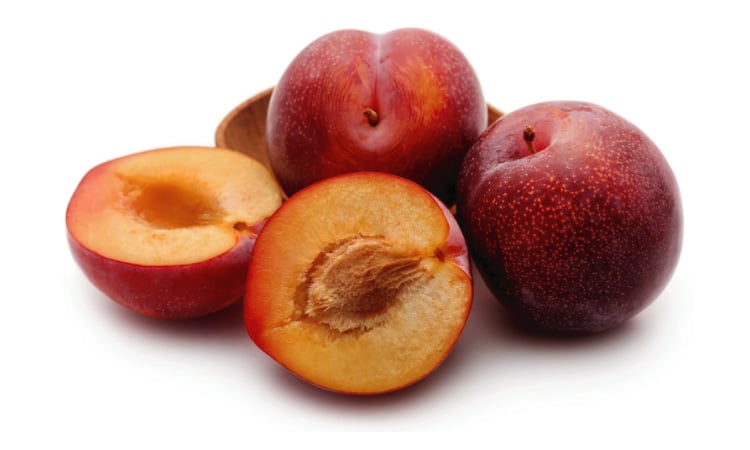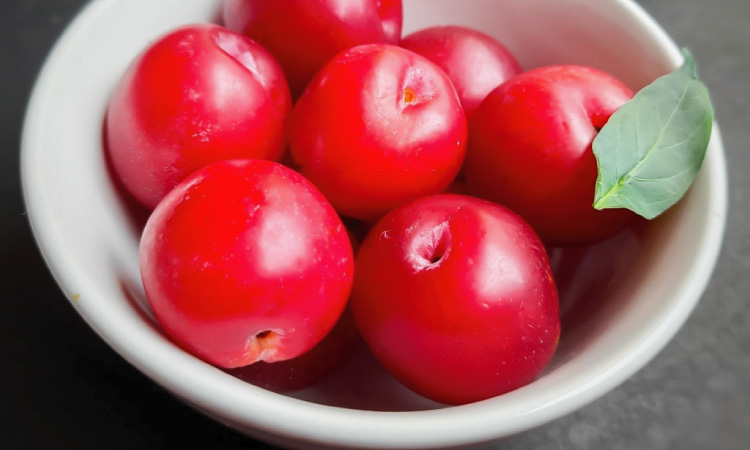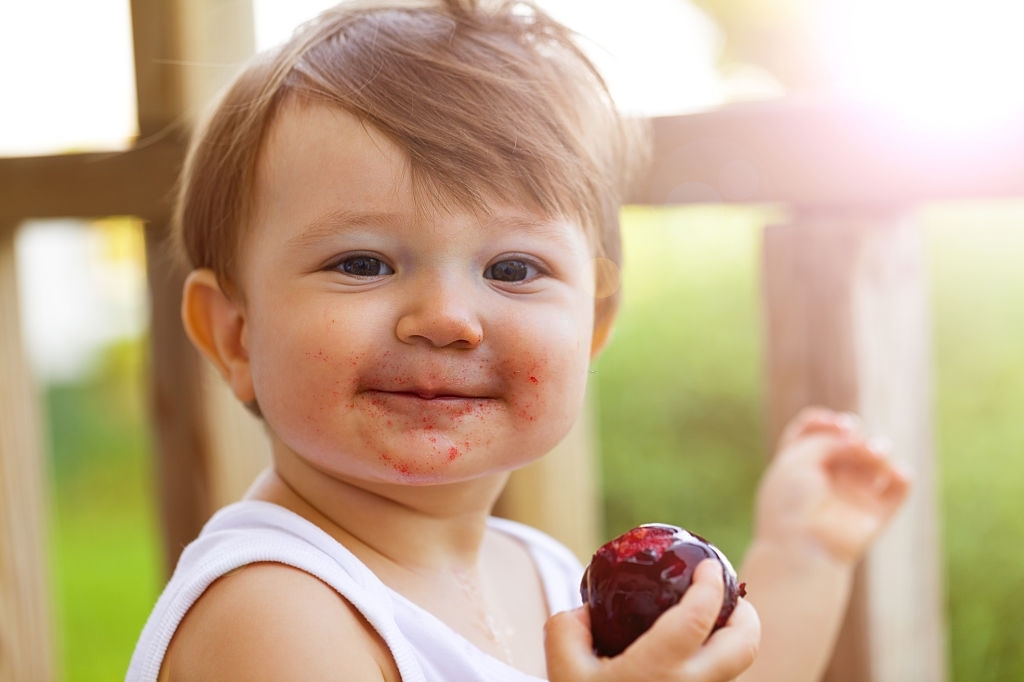When it comes to introducing new foods to babies, all we look at is how it fits as one of the most nutritious foods, and how well it adds essential vitamins and minerals to our child’s diet. But how about introducing plums for babies? Well, babies can eat plums once are past the mark of six months of age. Plums have anthocyanin and this helps in building anti-inflammatory, antioxidant, and memory-improving characteristics1– making them a great addition to your little one’s menu.
Though the nutritional profile of plums makes it a great food for babies over 6 months, you can check with your pediatrician to introduce plums for babies at the right time. Remember, it is recommended to offer only the flesh which is soft and ripe.
In this article, we will tell you everything you need to know about introducing plum to your baby.
Are Plums Safe For Babies?
Plums are safe to offer to your baby as long as they are introduced at the right age and in the right texture. Ensure that you take adequate care and precaution while offering plums for babies as it is prone to choking hazard. The skin and stone of the plum need to be removed before you offer it to your little one.
If you are introducing it as finger food and wondering are plums ok for babies, make sure the plums are cut into pieces as tiny pieces so the baby gets to hold it and you can rule out choking hazards.
Also, plums for babies are recommended as they are high in fiber, low in cholesterol, sodium-free, and rich in Vitamin A and Vitamin C2, and promote bone health which makes them a perfect superfood for your little one.
Related Reading: 10 Indian Baby First Foods 4-6 Months
When Can You Introduce Plum To Your Baby’s Diet?
According to a source, babies must be exclusively breastfed for up to six months. Hence, it is safe to introduce plums for babies after they have started solid foods. Plums or prunes do not pose a high allergy risk. Hence, they are recommended to be introduced to a baby anytime after 6 months of age. You can initially start with plum puree combinations for the baby.
Eating plums can have a laxative effect3. It is not uncommon to use plums for baby constipation. However, remember not to overdo it.
Also, we suggest you follow the three-day while introducing plums for babies. If your babies find any discomfort, we recommend you give them a break and start again. If your baby experiences any sores around the mouth, itchy rashes, or abdominal pain, rush to the doctor immediately.
Nutritional Value Of Plums

Plums and prunes are rich in nutrients. They contain various vitamins and minerals, in addition to fiber and antioxidants. Plums are also rich in vitamin B, phosphorus, and magnesium4.
Plums for babies are also beneficial in keeping the bowel movements at ease and preventing constipation as they are a high source of fiber. However, be mindful of the quantity offered as too many prunes at a stretch could lead to undesirable effects, such as diarrhea.
Prunes also contain several vitamins and minerals that aid in bone protection, and also are rich in vitamin K, phosphorus, magnesium, and potassium.
Related Reading: 21 Pregnancy Superfoods To Include In Your Pregnancy Diet
Health Benefits Of Plums For Babies
Plum is one of the small fruits that are rich in vitamins and nutrients, even when taken in a small quantity. Also, since plums are high in fiber and natural sugars, they help maintain bowel regularity. Plums offer a variety of benefits for babies even in the womb, like good for bone growth and also to maintain digestive health.
Plums and prunes are great to help with constipation, which is common for babies. Though plums have become a common fruit nowadays, many parents are still hesitant about offering this fruit as they are not aware if they need to offer raw plums for babies or the cooked form.
Listed below are the health benefits of plums for babies.
1. Plums for babies are good for bones
Plums come with a lot of benefits. Offering plum in the form of juice to infants such as healthy bones. It is also helpful for pregnant women as it aids in the development of the fetus in the womb. Also, plums have good calcium content which is beneficial for bone growth5.
2. Plums are rich in vitamin C
Plums are a rich source of vitamin C which is essential for the bones and teeth development in infants. Not only that, but they are also capable of increasing the body’s immunity system. Since babies are easily susceptible to various diseases, offering plums for babies is ideal.
3. Plums contains lots of fiber
High fiber content food helps to keep constipation at bay. Offering plums for babies help keep their digestive system healthy and ease bowel movements. And plums are a powerhouse of fiber.
The fiber in prunes is mostly insoluble, which means it does not blend with water. Hence, make sure to thoroughly wash the fruit before offering it to the baby.
4. Plums for babies make for sharp eyes
Infants these days get a lot of screen time because of which the chances of their eyes getting affected are high. Eye health for babies is crucial and parents need to concentrate on it early.
Related Reading: Is It Safe To Apply Kajal To Baby’s Eyes?
One way to maintain eye health is to offer plums for babies as they are a rich source of vitamin A and beta carotene that play a role in maintaining eye health6.
5. Prevents constipation
Constipation is just not restricted to adults. Even kids face constipation problems and even worse they can’t explain. Plums are known for their fiber content and including it in your baby’s diet will make wonders. It helps to keep the tummy healthy and comfortable.
How To Buy And Store Plums For Baby Food

Plums and prunes are some of the highly contaminated fruits. Washing properly can ensure the dirt, bacteria and any pesticide residue does not get consumed by you or your family.
Just like any other fruit, plums are very delicate. Use plums within a week from buying. Also, keep them well stored. Storing plums for babies more than the recommended time could make them become bruised and softened.
Choose plums that are without bruising, soft spots, or cuts. Also, while choosing dried plums for babies, make sure they are naturally dried and do not use sulphur. Many stores use chemicals and preservatives to the packet. Remember, plums that are dried either via a fan, a food dehydrator, or dried in the sun will not look glossy and perfect.
Avoid plums that come with shiny skin, or that are light green – these are unripe. Similarly, avoid over-ripe plums too, which will be all squishy. Plums last for 2-3 days at room temperature and a week in the refrigerator. Plums can also be frozen for longer storage.
Risks And Precautions When Giving Plums To Babies
Though there are many health benefits of plums for babies, there are also a few side effects or risks that you must consider before offering it to your little one.
1. Can cause allergy
Some individuals with a history of severe reactions to certain stone fruits. Though plums for babies do not cause an allergy in most cases, someone who is allergic to birch pollen should not eat a plum. The protein content on both of them is similar. Therefore, it results in allergic symptoms in the mouth and throat with itching and inflammation. Hence it is better to be avoided.
Cooking and peeling the fruit may help reduce reactions for those who are sensitive.
2. Plums for babies can be a choking hazard
Plums can present a choking risk when the fruit is strong and/or small. Dried plums or prunes are also choking hazards just like any other dried fruits. The hard pit inside the plums needs to be removed while offering to your little one. Make sure the child is within your arm’s reach to avoid any mishaps.
3. Plums can cause diarrhea in babies
Plum for babies is good to treat issues like constipation. Since the fiber content in this fruit is high, too much consumption could end up having severe stomach troubles with loose stools and diarrhea.
Precautions When Giving Plums To Babies

Eating a variety of fresh fruits and vegetables is part of a healthy diet. But there are a few precautions that you have to follow while offering plums for babies.
- See if the child is irritable and cranky for no apparent reason
- Check if the belly is hard to touch and feel after offering plums
- The baby appears in pain or red-faced when passing stools
- For infants dried prunes can be quite hard as they tend to stick to the teeth. Choose the texture according to the age of the baby
- Perfectly ripe plums have a short shelf life. Learn the right techniques to protect them
- Plums can cause gastrointestinal discomfort like bloating and gas. Keep mindful not to overdo it
Conclusion
Plums are a good source of calcium, vitamin A (in the form of beta-carotene), vitamin B2, vitamin C, vitamin E, and fiber. Remember it is important that you use fully ripe plums when preparing your plum baby food recipes.
Make sure to use clean, running water when washing your fruits and vegetables. Also, clean them before peeling or preparing them. Also, in whatever form plums for babies are offered, plums are known the best to improve the immune system and maintain eye health. If your baby has just started solids, try to offer plums in pureed form.

